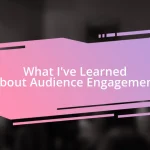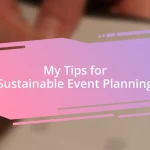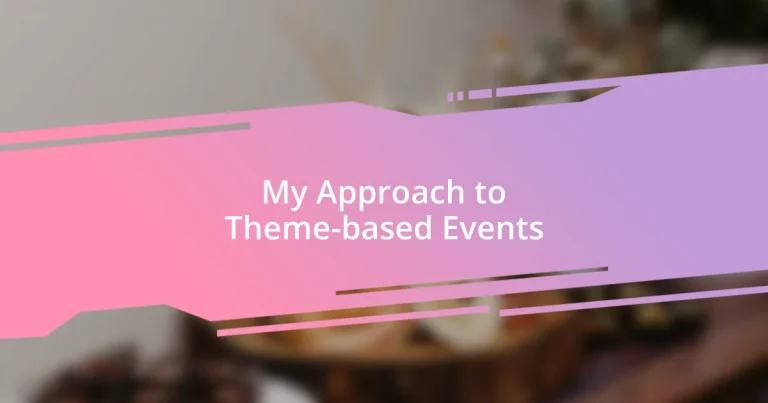Key takeaways:
- Theme-based events foster emotional connections and enhance social interactions, making gatherings more engaging and memorable.
- Choosing the right theme involves understanding audience interests, event goals, logistical considerations, and ensuring cohesion across all elements.
- Success evaluation should include both qualitative feedback and participant engagement metrics to capture the true impact of an event on attendees.
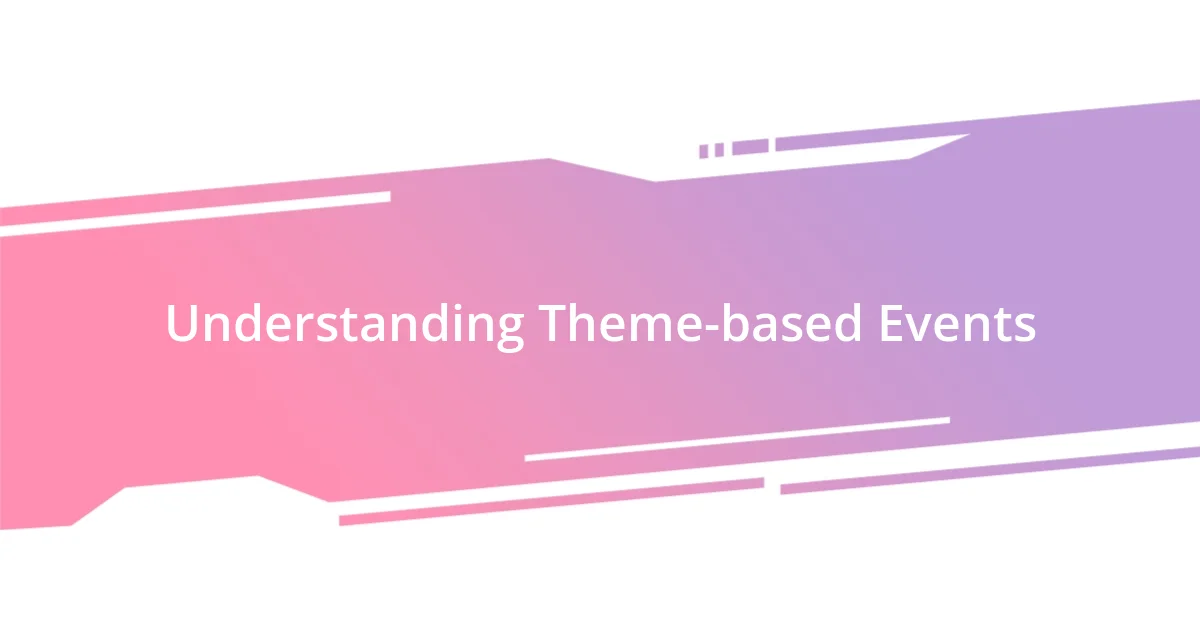
Understanding Theme-based Events
Theme-based events are powerful tools that can transform ordinary gatherings into extraordinary experiences. I remember organizing a retro-themed party where guests arrived dressed in vibrant 80s attire. The atmosphere was electric, filled with excitement and nostalgia—a testament to how a theme can evoke emotions and create a shared experience.
But what makes these themes so compelling? They offer a framework that helps attendees connect on a deeper level, often tapping into shared memories or cultural references. I’ve noticed that when discussing ideas for events, people light up at the thought of immersing themselves in a specific time or place. It’s this emotional connection that can take an event from forgettable to unforgettable.
Moreover, the beauty of theme-based events lies in their versatility. Whether it’s a whimsical garden party or a corporate gala, a well-chosen theme can guide everything from décor to the menu. I’ve planned a few events where the theme dictated every detail, and seeing the attendees fully embrace it was incredibly rewarding. How often do we get to escape reality and step into a carefully curated world, even just for a few hours? That’s the magic of themed gatherings!
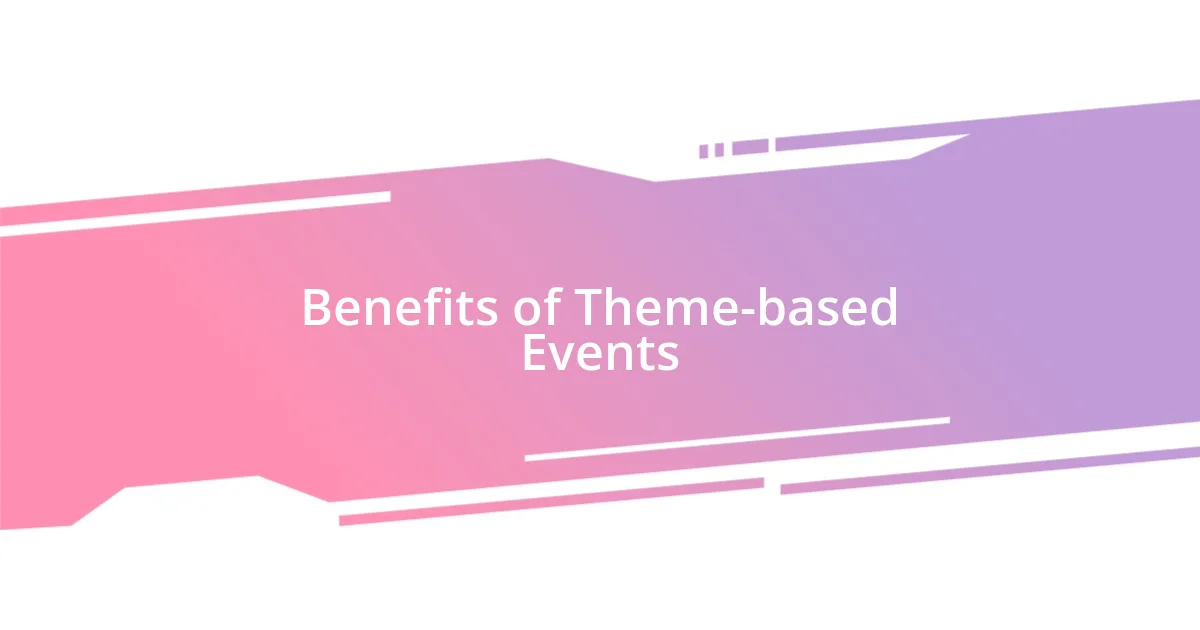
Benefits of Theme-based Events
Theme-based events bring a multitude of benefits that extend beyond mere aesthetics. Personally, I’ve observed that themes can break down social barriers, creating an inviting atmosphere where guests feel encouraged to mingle and engage. For example, I once hosted a masquerade-themed ball, and the masks instantly added an air of mystery, prompting even the shyest attendees to interact. It was incredible to see how a simple theme sparked conversations and new connections.
From my experience, these events can also enhance branding and marketing efforts. When I organized a sci-fi themed convention for a tech startup, the vibrant visuals and engaging activities attracted a broader audience, making the brand memorable. The theme gave attendees a clear identity to connect with, which, in turn, enhanced their emotional engagement with the brand. Such experiences are crucial in a landscape where first impressions are everything.
Incorporating themes effectively can significantly boost the overall enjoyment and satisfaction of attendees. I remember a summer BBQ with a tropical theme. The vibrant decor and themed cocktails turned a simple gathering into a colorful escape. People left with smiles, reminiscing about their favorite moments. That’s the kind of lasting impression that can elevate events from mere get-togethers to unforgettable experiences.
| Benefit | Description |
|---|---|
| Social Connection | Themes foster interactions among attendees, promoting a more engaging social atmosphere. |
| Branding Impact | A well-executed theme enhances branding and creates memorable experiences linked to a business or product. |
| Enhanced Enjoyment | Themed elements boost attendee satisfaction, turning events into enjoyable experiences they will talk about long after. |
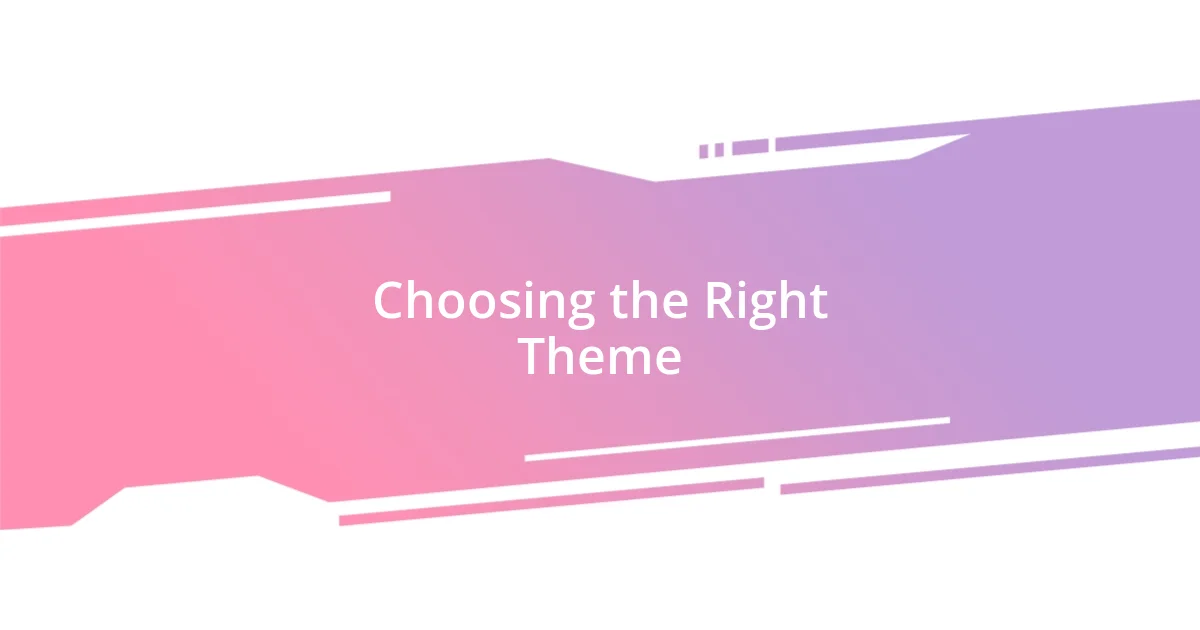
Choosing the Right Theme
Choosing the right theme can be one of the most exciting yet challenging aspects of planning an event. I recall a corporate retreat where we struggled to select a theme that resonated with both the team’s goals and personalities. Eventually, we landed on a “Great Outdoors” theme. This choice not only reflected our company’s appreciation for nature but also encouraged team bonding through activities like hiking and campfire storytelling. I found it fascinating how the right theme can not only enhance engagement but also promote a sense of unity among attendees.
When considering a theme, it’s important to think about a few key factors to ensure it aligns with your objectives and audience. Here’s what I find helpful to focus on:
- Audience Interests: What resonates with your guests? Consider their demographics, preferences, and experiences.
- Event Goals: Reflect on what you want to achieve. Is it networking, celebration, or brand awareness?
- Logistics: Ensure the theme is feasible within the venue, budget, and resources available.
- Cohesion: A successful theme should seamlessly integrate with all aspects of the event, from invitations to décor to activities.
By carefully evaluating these elements, you can choose a theme that not only captivates but also connects people in meaningful ways, creating an unforgettable experience.

Designing Event Experience
Designing an event experience involves weaving together all elements to create a cohesive and immersive journey for attendees. I remember when I crafted a winter wonderland theme for a charity gala. Every detail mattered, from the icy blue lighting to the snowflake centerpieces. It wasn’t just about the visuals; it was the overall feeling of being transported into a magical realm that made the night unforgettable. Have you ever walked into a space that felt completely different from the one you just left? That’s the power of thoughtful design.
Another aspect I emphasize in designing event experiences is storytelling. One of my favorite moments was at a “Hollywood Nights” themed event where we incorporated a red carpet, complete with photo ops that mimicked iconic film scenes. Guests didn’t just attend; they stepped into their favorite movie moments. I could see guests light up as they posed like stars, creating memories that were both hilarious and heartwarming. Isn’t it amazing how a well-planned experience can transform an event into a narrative that attendees feel part of?
Lastly, don’t underestimate the impact of sensory elements. Think about the smells, sounds, and tastes that can enhance the atmosphere. During a garden-themed wedding I organized, we included fragrant flower arrangements and played soft sounds of nature. The joyful expressions on guests’ faces as they savored the fresh, seasonal dishes were a delight to witness. I often ask myself: how can you engage someone’s senses in a way that leaves a lasting impression? The answer lies in the details, and I truly believe that’s where the magic happens.

Engaging Your Audience
Engaging your audience goes beyond mere participation; it’s about creating a connection. I once attended an interactive workshop where the facilitator encouraged everyone to share their personal stories related to the theme. The room buzzed with energy as participants opened up, transforming what could have been a dull lecture into a lively conversation. Isn’t it remarkable how vulnerability can break down barriers and foster a sense of community?
Another effective engagement strategy is incorporating interactive elements that invite hands-on involvement. During a “Culinary Journey” themed event I organized, we set up cooking stations where guests could create their own dishes. The laughter and chatter that filled the air was palpable! It’s fascinating to see how such activities not only engage the audience but also spark spontaneous connections among attendees. Have you ever noticed how the simple act of sharing food can bring people closer together?
Lastly, I pay attention to how I can enhance audience engagement through follow-up. After an event, I love sending out personalized thank-you messages that reference specific moments or interactions. This reinforces the connection made during the event and encourages ongoing dialogue. It prompts me to reflect: how can we continue the conversation even after the lights dim? In my experience, sustaining that relationship is key to ensuring participants feel valued and eager for future events.

Evaluating Event Success
Evaluating the success of a theme-based event requires looking beyond just attendance numbers. For instance, after one of my favorite events—a “Roaring Twenties” gala—I surveyed attendees to gather their thoughts. Their enthusiastic feedback about the immersive experience we created made me realize how vital emotional connection is to event success. Isn’t it intriguing how a simple survey can unveil the heart of what made an event truly resonate with people?
I often employ specific metrics to gauge success, such as participant engagement levels during the event. At a recent “Adventure Awaits” themed corporate retreat, I observed how involvement in team-building activities significantly boosted camaraderie among attendees. The joy I saw on their faces and the animated discussions afterward were my own indicators of success. Have you ever experienced that electrifying atmosphere that lingers well beyond the event? To me, it’s a sign we achieved more than just bringing people together—we created lasting memories.
Ultimately, qualitative feedback can be just as crucial as quantitative data. After an elegant masquerade ball, I received heartfelt messages from attendees expressing how the night transported them to another world. These emotional affirmations offer a glimpse into the impact we’ve made. Reflecting on this, I realize that capturing the essence of guest experiences is invaluable when evaluating success. It’s not merely about metrics—it’s about the stories we create together.







